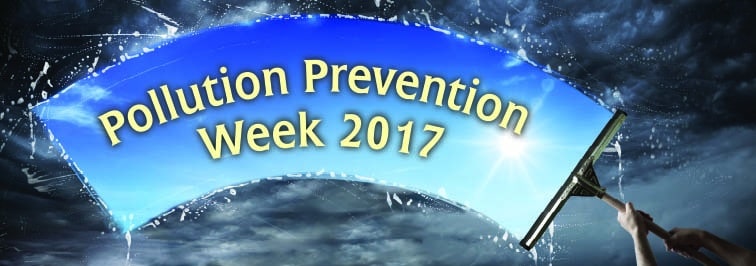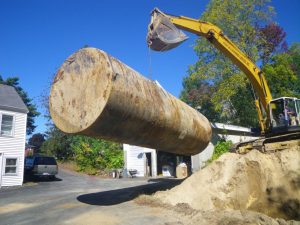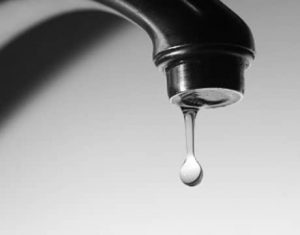 Pollution Prevention Week takes place each year during the third week in September. This special week celebrates the passing of the Pollution Prevention Act in 1990, and serves as an opportunity for businesses, individuals, governments, organizations, and groups to focus on pollution prevention (P2) by celebrating their sustainability achievements, expanding current practices, and implementing new initiatives. In addition, P2 Week serves to remind individuals and organizations of the myriad ways that pollution can be prevented.
Pollution Prevention Week takes place each year during the third week in September. This special week celebrates the passing of the Pollution Prevention Act in 1990, and serves as an opportunity for businesses, individuals, governments, organizations, and groups to focus on pollution prevention (P2) by celebrating their sustainability achievements, expanding current practices, and implementing new initiatives. In addition, P2 Week serves to remind individuals and organizations of the myriad ways that pollution can be prevented.

While many organizations and initiatives focus on recycling and mitigation, the most efficient and beneficial way to protect the environment is to avoid pollution in the first place. Once the environment has been compromised, it is much more labor intensive, energy intensive, and costly to return conditions to their natural state. For example, ensuring that double-walled Underground Storage Tanks (USTs) are maintained and in good condition is critical to the protection of groundwater and soil. When a UST leaks and contaminates the surrounding area, soil remediation is required, which in some cases can cost hundreds of thousands of dollars. In addition, any contaminated water will require a much more comprehensive treatment train, leading to expensive infrastructure projects and higher operational costs for water utilities. Preventing the leak in the first place requires simple maintenance and monitoring, such as regular testing of leak detection systems, maintaining accurate inventory records, and maintaining spill buckets, which comes at a small fraction of the cost of clean-up activities to both the wallet and the environment.
Pollution prevention is just as important on an individual level. While the actions of one person may seem insignificant, the collective action of millions of individuals is monumental. In celebration of P2 Week, we’ve assembled 20 simple tips that we can all implement to minimize our environmental footprint.
- Make sure your home is well-insulated and has energy efficient windows.

While not practical for everyone, chickens provide grub control, aeration, and fertilization for lawns. - Practice environmentally-friendly lawn care (Here are 10 tips to start!)
- Use water-based paints and be sure to rinse paint brushes in the sink, where the water will eventually make its way to a wastewater treatment plant, and not outdoors, where the paint will end up in the groundwater.
- Utilize LED lights instead of fluorescents, which may contain mercury. When disposing of fluorescent bulbs, be sure to take them to a certified collection center.
- Plant trees. They help to keep the air clean.
- Utilize recycled content plastic lumber for decks. Plastic lumber lasts far longer than wood lumber and requires no painting.
- Fix leaks and install water saving faucets and fixtures. (Visit here for more water tips!)
- Compost kitchen scraps with worms. Bonus: you’ll get free, organic plant food.
- Always bring reusable bags to the grocery store. Worldwide, we throw away over one trillion plastic bags each year, many of which end up in our oceans.
- Buy products in the highest bulk possible to avoid excess packaging.
- Use non-toxic household cleaners and personal care products.
- Dispose all prescription drugs at a certified drop-off location. Do not flush! Prescriptions are wreaking havoc on our water supply.
- Use cloth napkins instead disposables, and washable rags instead of paper towels.
- Buy organically grown food. Pesticides contaminate our water and harm our environment.
- Use reusable glass containers for leftovers and lunches. Avoid plastic baggies and boxes.
- Lower household heat by a degree or two, and have the boiler serviced annually to increase efficiency.
- Be sure appliances are energy and water efficient, and only run the dishwasher and clothes washer with full loads.
- Carpool, walk, or bike to work, or use public transportation. If possible, work at home one day per week to save fuel and energy.
- Buy washable clothing that doesn’t require dry cleaning. Dry cleaners are a large contributor to environmental contamination.
- Use rechargeable batteries, and be sure to dispose regular alkaline batteries at a certified drop-off location. Batteries can wreak havoc on our soil.
Do you have any other easy tips to prevent pollution? If so, share them in the comments. As Vincent Van Gogh said, “Great things are done by a series of small things brought together.” At Tata & Howard, each of us looks forward to creating a greener, healthier future by doing our individual, small part to decrease pollution. Happy Pollution Prevention Week!

